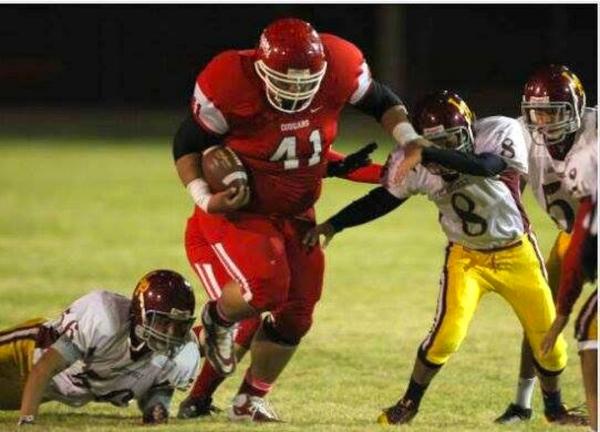When the story appeared about Tony Picard, the 400-lb running back and nose tackle for White Swan High School, it was an immediate sensation. Picard appeared in local and national news interviews, including CNN and ABC’s Good Morning America. A YouTube video of a collection of plays his plays gained more than 3 million views. ICTMN caught up with Picard for a Q&A to further introduce him to Indian Country.

Jack McNeel 12/1/13 ICTMN.Com
What has happened to you since the story came out?
I’ve been getting multiple phone calls. I went on national news. It’s been pretty crazy. I’ve still got more to do.
What has your reaction been to all the attention?
At first it was just crazy. All the attention is nice, but after so much, it kind of gets to you. I’m liking it, but I’m not getting all big-headed about it.
Have you heard from other college coaches since the story came out?
Yeah. I’ve heard from quite a few actually. [I’m] heading up to Washington State University for a recruiting trip.
How are your teammates taking it?
They’re just supporting me.
What is your hope for the future, five or ten years down the road?
I’d be finishing my last year of playing college football. I wouldn’t mind playing in the pros, and I think it would be an honor to play in the NFL. Other than that, if I don’t go to the NFL, I’d go to school for forestry or be a wildlife conservation officer.
What do you think about when you shake the other team’s captain’s hands?
Honestly there’s nothing going through my mind. I just shake their hand to show some sportsmanship. I don’t want to beat them up, but just win the game.
Do your teammates have a nickname for you?
Everybody calls me “Big Tone.”
Away from football, do you have hobbies?
Yes I do. I like to go hunting. I like to fish. I like to be out with family and friends.
What animals have you taken?
I’ve shot deer, elk, moose, buffalo, and bear. Also, coyotes and turkeys.
Do you have a girlfriend?
Yes.
Do you feel you’re pretty much a typical high school senior?
Yeah. A lot of people see me as famous right now, but I am just a normal high school student.
